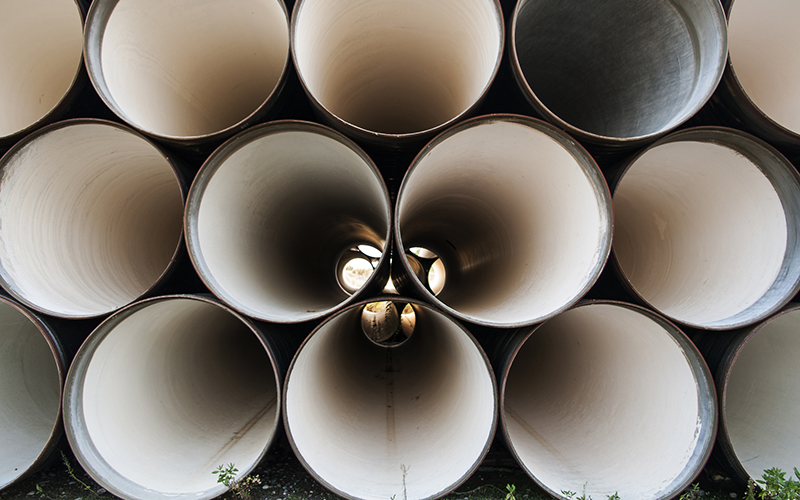
by guest blogger Maya K. van Rossum, the Delaware Riverkeeper
Every month, inside the walls of glass and concrete of a Washington, DC, office building, the Federal Energy Regulatory Commission (FERC) approves major new pipeline projects, along with the expansion of existing projects, pipeline compressors, and liquefied natural gas (LNG) export facilities. They do this seemingly without question of their approvals’ impacts on citizens, the environment, or future generations. Imagine a government agency with power yet little to no accountability. You’ve just imagined FERC.
But there is a point at which people get fed up and finally fight back. As Martin Luther King Jr. put it, “There comes a time when people get tired of being trampled over by the iron feet of oppression.” For many Americans, that time has come. And unless FERC ceases its ways, that moment will come for many more.
In January, FERC issued an order permitting a multinational company to seize and cut 80 percent of the trees in a forest in New Milford Township, Susquehanna County, Pennsylvania, and replace them with a natural gas pipeline. That forest has belonged to the Holleran family since the 1950s. The property is where the Hollerans live and also where they tap 300 maple trees to make maple syrup, turning what was a backyard hobby into a family business, North Harford Maple.
FERC permitted the tree cutting even though the Constitution pipeline had not yet received a Clean Water Act approval from the state of New York, without which the New York portion of the pipeline cannot be built.
In the face of FERC’s decision, the Hollerans—and dozens of their neighbors—stood by their beloved trees as chainsaw-wielding men came to destroy the family farm. “This is our land and family business, and we just staged our equipment to set up for this year’s syrup production,” said a member of the Holleran family. Police were called but refused to evict the family from its own land without a court order.
The Constitution Pipeline Company then took the Hollerans to court to prevent the family and community from defending their land. A court agreed with the company, and soon the Hollerans’ land will be destroyed for a proposed pipeline that could greatly pollute the surrounding environment.
The Environmental Rights Movement
Natural gas pipelines like the Constitution Pipeline are threatening farmers, homeowners, land trusts, businesses, schools, and towns across the nation. Homes, livelihoods, businesses, and lands are being destroyed despite the staunch opposition of the property owners. Communities are rising up in opposition, though precedent predicts that approval of the pipelines by FERC is virtually guaranteed—FERC has never rejected a pipeline proposal brought before its commissioners for at least 40 years.
We cannot leave these families to protest these unjust losses alone. They need allies willing to fight the injustices at FERC.
More than 237 organizations from across America have stepped up to be just such allies. They have urged Congress to direct the Government Accountability Office to investigate FERC and identify much-needed legal reforms.
But until FERC respects the rights of people to keep their land, we will see more individuals following in the footsteps of Dr. King. The Civil Rights Movement began with a few simple but brave and important acts: a refusal to change seats on a bus, a sit-in at a diner, a protest in support of equal access to good schools. Despite the many attempts to ignore, dismiss, and overshadow these acts, the Civil Rights Movement grew, and the power of its message and substantive validity finally gained widespread acceptance and, eventually, lionization.
That is the path of today’s environmental rights movement. It reflects the growing opposition to drilling, fracking, and all the infrastructure pipelines, compressors, and LNG export facilities that are destroying communities and environments to service the fossil fuel industry. It isn’t going away.
Taking Action to Help
Support an independent investigation into the abuse of process and law by FERC, including its bias in approving pipeline projects. If you are an individual who wants to join the fight, please sign our petition and pass it on at: bit.ly/DRN-PetitionToReviewFERC. If you are the leader of an organization concerned about FERC, you can sign on to our organizational sign-on letter at: bit.ly/SignOnGAOReview.
 Maya K. van Rossum is the Delaware Riverkeeper, and has led the Delaware Riverkeeper Network (DRN) since 1994. The DRN is a regional nonprofit advocacy organization that monitors the river and all of its tributaries for threats and challenges, and advocates, educates, and litigates for protection, restoration, and change.
Maya K. van Rossum is the Delaware Riverkeeper, and has led the Delaware Riverkeeper Network (DRN) since 1994. The DRN is a regional nonprofit advocacy organization that monitors the river and all of its tributaries for threats and challenges, and advocates, educates, and litigates for protection, restoration, and change.




The Constitution Pipeline treecutting contractors showed up at the farm with a security team armed with AK 47 submachine guns to ward off anticipated civil disobedience by protesters. The “Constitution” is being upheld by assault weapon force.
Dr. King was a socialist who fought racists who invoked private property rights to enslave black people and then to repress them in “separate but equal” state based Jim Crow legal regimes.
The thought of citing King to defend private property rights, even from the ravages of a corporate pipeline, is revisionist and offensive.
If you want to invoke King, focus on the public lands that the pipeline will destroy – the public waters, the public air, and the public’s CLIMATE FUTURE.